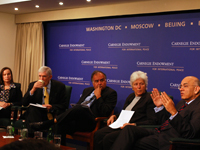Registration
You will receive an email confirming your registration.
The Arab Spring has toppled three governments and galvanized change across the Middle East. But fiscal, external, and labor market imbalances are widening, and both new and old governments are under pressure to deliver simultaneously on political, economic, and social fronts.
Carnegie’s Uri Dadush joined Masood Ahmed of the International Monetary Fund (IMF), Caroline Freund of the World Bank, Under Secretary of State for Economic, Energy, and Agricultural Affairs Robert Hormats, and Carnegie’s Marina Ottaway to discuss the economic and political dimensions of the Arab Spring.
Economic Factors and the Arab Spring
Political demands are at the heart of the Arab Spring, but economic reform will be critical to maintaining political stability and facilitating political reform.
- Politics: The panelists agreed that the Arab Spring is being driven mostly by political demands for dignity, greater participation in civil society, and a larger role in governance, and that the Arab world’s focus remains on political reforms. Freund and Ottaway noted that, if the Arab Spring gets derailed, it will most likely be for political or security reasons.
- Economics: Economic discontent runs high over unemployment, inequality, and limited access to economic opportunity and is fueling political discontent, Hormats said. Economic and political reforms are, moreover, intertwined. Many economic problems in the region are the result of poor governance, though Hormats and Ottaway noted that political reforms may not be sustainable without structural changes enabling higher growth and more job creation.
The Economic Outlook for MENA
The IMF’s 2010 projections showed a rapid recovery for MENA countries in 2012. But this year’s projections reflect a more drawn-out recovery process due to acute fiscal challenges in the short run and structural macroeconomic challenges in the long run.
- A Difficult Short-run Environment: Freund noted that the Arab Spring was followed by a steep drop in tourism in Egypt and Tunisia and a sharp slowdown in business investment. The MENA governments (especially oil importers, which face, on average, an 8.5 percent budget deficit) are also strained fiscally because they are paying out large food and fuel subsidies.
- Long-term Structural Challenges: Youth unemployment in the Middle East is very high—20 to 30 percent—and most MENA countries are not growing fast enough to keep up with their expanding labor force, added Ahmed. Disparities in access to economic opportunities are, in addition, very wide across firms.
Reform in “Non-transition” Countries
The Arab Spring’s impact on non-transition countries is both “real” and psychological.
- Spillover Effects: The Arab Spring has affected non-transition countries through the channels of migration, economic transfers (remittances), and business confidence. Non-transition countries are also forming their expectations of change by looking at their neighbors.
- A “Split Personality”: Ottaway noted that there is a “split personality” among non-transition countries on the issue of reforms. While there is resistance to change and very little actual reform has taken place so far, there is also a consciousness of the need for reform.
Prospects for MENA Growth and Job Creation
Discussion on political reform is more advanced in the Arab world than discussion on economic reform. Panelists discussed several constraints on meaningful economic reform moving forward:
- Distrust of Privatization and Liberalization: The panelists observed that there is a backlash against privatization and liberalization in the Middle East because, so far, elites have reaped most of the benefits from economic reform.
- Role of the Informal Sector: Freund argued that the informal sector is a big job creator in the Arab world and should not be seen as a problem, so much as an indication of how difficult it is for small and medium enterprises (SMEs) to get into the formal sector.
- Intra-regional Trade: Ahmed and Freund stated that more intra-regional trade would send a signal to investors that a region like MENA can function as a single large market and serve as a hub for economies of scale. Ottaway expressed doubt, however, that intra-regional trade will take hold because of political obstacles.
- Greater Market Access: Trade agreements could help spur reform, but previously they have not always resulted in gains for the MENA region. The Morocco-U.S. trade agreement, for example, has resulted in more U.S. exports, but little change in Moroccan exports, Freund said.
The International Community’s Role
The international community is not rushing to support the Arab world’s transition—and may not in fact need to—for several reasons.
- “Tragic” Timing for the West: Hormats noted that the United States is finding it difficult to respond constructively to changes in the Arab world that it has long supported due to tough fiscal constraints. Still, there are efforts to “reprogram” funding in existing pipelines by backing the Deauville Partnership, supporting SMEs through the Overseas Private Investment Corporation (OPIC), and supporting multilateral initiatives.
- MENA Ambivalence: Ottaway pointed out that Egypt’s recent refusal to accept loans from the IMF was mostly a political statement, emphasizing the country’s self-reliance. Ahmed and Freund noted that the MENA region actually has significant reserves to draw on, which means that it may not need enormous external aid.
- Unclear Funding Needs: Freund noted that now may not be the right time for huge amounts of money to go into the MENA countries. Ottaway agreed, noting that Egypt (holding presidential elections in 2013) and Libya (facing protracted instability) are still very much in transition.
- Need for External Incentives. A big incentive for Eastern European countries to quickly move forward on reforms in the 1990s was the prospect of joining the EU and NATO, Hormats said. There is no similar “pull factor” for MENA countries who want to deepen their links to the global community, though trade agreements could potentially serve a similar function.
